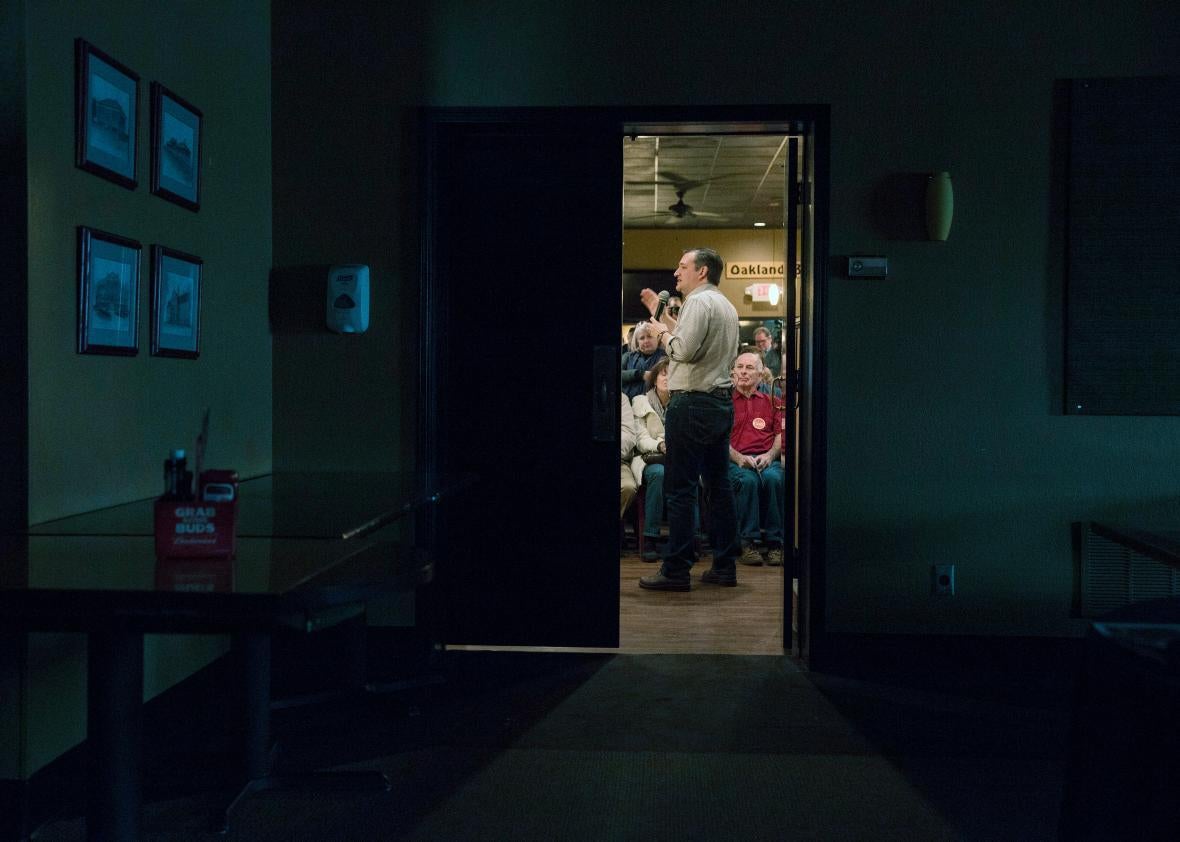Heading into Christmas, Ted Cruz had emerged as the clear favorite to kick off the Republican nominating contest with a victory in Iowa. He was racking up endorsements from evangelical leaders/kingmakers and was starting to pull away in state polls. But with less than three weeks to go until the GOP caucus, Cruz now has real reason to worry.
The latest sign Iowa could come down to the wire between him and Donald Trump comes via a new Des Moines Register/Bloomberg state poll, which shows the fiery Texas senator’s lead on the loud-mouthed tycoon shrinking from 10 points to 3 points among likely Republican caucusgoers in the past month:
- Ted Cruz: 25 percent, down 6 points
- Donald Trump: 22 percent, up 1 point
- Marco Rubio: 12 percent, up 2 points
- Ben Carson: 11 percent, down 2 points
As Ann Selzer, the well-respected director of the poll, points out, the narrowing race isn’t the result of a late Trump surge—the Donald’s been holding remarkably steady in Iowa for months—as much as an erosion in Cruz’s support. “It’s hard to say Donald Trump is back, because his support grew only one point,” she said. “It seems more a matter of slippage for Cruz.”
His drop could be the result of the increased attention that comes with being the favorite—which has included plenty of chatter about his Canadian roots—or it could be explained by something else, including statistical noise. Either way, Cruz doesn’t look as strong in Iowa today as he did in late 2015.
Of the six state surveys taken in the new year, Cruz led three and Trump led three, with neither man posting an advantage of more than 4 points. The RealClearPolitics average of those polls, meanwhile, has Cruz with a scant, half-point lead on Trump, 26.7 percent to 26.2 percent—down from four points shortly before Christmas. (Rubio currently sits in a distant third place with 13 percent.) Based only on the state polls, Nate Silver and his FiveThirtyEight team peg Cruz’s current chances at winning the caucus at 42 percent, and Trump’s chances at winning at 40 percent.
Still, Cruz shouldn’t panic. The polls tell us much more about today than they do about Feb. 1, when Iowans will officially kick off the 2016 presidential nominating contest. With less than three weeks to go until then, more than half of the respondents in the Register poll said that they could still be persuaded to back a different candidate (though those backing either Trump or Cruz are the most likely to say their mind has been made up). That could create a serious opening for Cruz, who is the second-choice of 23 percent of Iowa Republicans, compared with 11 percent for Trump. The doom-saying senator also appears to have the advantage when it comes to ground-level organization in the state, something that has traditionally been integral in a contest that sees only about 1 in 5 registered Republicans show up to caucus. Meanwhile, when Silver and his team factor in endorsements and national polls, they see Cruz’s chance of an Iowa victory rising to 50 percent and Trump’s falling to 26 percent. (FiveThirtyEight has found some evidence it may actually be a bad thing in the long term to be doing better in national polls relative to early state surveys, which is one reason Trump’s prospects drop when you add other factors to the state poll numbers.)
In the end, Iowa might serve as a microcosm for the entire GOP campaign: If Trump’s appeal is enough to convince large numbers of first-time voters to show up and caucus on a cold, dark night in Iowa, he’ll be well-positioned to steal an early victory that Cruz was counting on. If Trump can’t pull it off, though, Cruz could coast to caucus victory and deliver a sizable blow to Trump’s blustery brand, which has been built on his polling performances. Either way, the race will arrive in New Hampshire the next day with the GOP establishment trailing the winners and desperate to rebound.
Previously on the Slatest:
